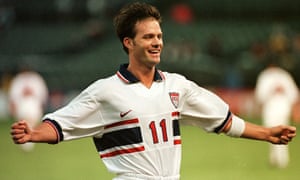Eric Wynalda doesn’t yet know if he will run for president of the United States Soccer Federation next year but he does know something has to change at the top of the sport in America.
Wynalda, apparently, is not alone. After 11 unchallenged years as USSF president, incumbent Sunil Gulati will face at least two – and possibly more – declared rivals at an election in February.
Wynalda comes with a broad perspective on the state of the American game. A Hall of Famer with more than 100 appearances for the men’s national team, his 34 goals made him all-time leading goalscorer until Landon Donovan broke that record in 2007. Now 48, he was the first American to play in the Bundesliga before Jürgen Klinsmann made that cool – if not mandatory – and scored the first-ever goal in Major League Soccer. He is a coach and now known as a TV pundit with Fox Sports.
“I’ve stood back for two decades waiting for things to get better,” Wynalda says. “What I’ve realized is that there is not a whole lot of people who are willing or even wanting to invoke change. Out of moral obligation, I think I’m finally at the point where I’m asking, ‘What can I do to help?’ I don’t want to tweet something or write an article or start a fight. I want to roll up my sleeves.”

Disquiet about Gulati’s leadership has been growing in the broader soccer community, heightened by the tepid performance of the men’s national team under Klinsmann and deja vu successor Bruce Arena – both handpicked by Gulati. While on-field results can’t be directly attributed to a man who teaches economics at Columbia University for his day job, they can be a symptom of deeper issues, according to Wynalda.
“I’ve had at least 50 calls from people encouraging me to run,” Wynalda says. “Not just people on Twitter who want promotion and relegation and want the [USSF] house of cards to fall. I’ve heard from people who want to know how we can make soccer better in this country.”
The success of soccer in the US, Wynalda says, should not just be measured by participation rates and revenue streams if that doesn’t translate to broader development and evolution.
“Just because the masses are playing the sport, they think success is going to magically happen some day by accident,” Wynalda says. “Sometimes it does – a Clint Dempsey, Landon Donovan, or Christian Pulisic happens – but that is not good enough. Coming 18th at a World Cup is not a success story.”
Off the field, Gulati can claim the federation’s good financial position, its influence within Concacaf and Fifa, and the 2026 joint World Cup bid, in his favor. He has also successfully avoided any USSF links to the Fifa corruption scandal despite Department of Justice indictments nailing individuals doing business in or from the US right under the nose of his organization.
Gulati was close to the late Chuck Blazer, the corrupt former Fifa vice-president and Concacaf general secretary who turned FBI informer, and has never clarified the dynamic of that relationship or if he has been interviewed in ongoing DoJ and Swiss investigations into soccer corruption.
While Wynalda contemplates whether to make a move, Boston attorney Steve Gans has declared he wants Gulati’s job. Gans said in a recent interview with the Washington Post that the state of the game “feels more like 1989 or 90”. Also running is Paul Lapointe, a Massachusetts-based former indoor soccer team owner, while John Motta – another New Englander – is a US Soccer board member considering a challenge.
Motta is president of the United States Adult Soccer Association (think amateur players), a Dunkin’ Donuts franchise mogul and the only person to ever defeat Gulati in an election. In 1998, Motta beat Gulati, then an MLS deputy commissioner, in a vote to elect a USSF vice-president. Still, Gulati persisted. Eight years later he was elected USSF president.
Of course, Gulati has not yet signalled whether he even intends to run again but the lure of four more years at US Soccer – especially if it wins hosting rights for the 2026 World Cup – is powerful, even more so with Gulati’s elected position on Fifa’s perk-heavy council. However, an option mooted by some insiders is for Gulati to step aside and usher in US Soccer vice-president Carlos Cordeiro, a former Goldman Sachs executive, as his status quo successor.
Wynalda believes Gulati’s time as an unchallenged leader is over and, as every economics professor knows, the theory is that competition breeds innovation and success.
“I don’t think it is healthy [to have someone in charge for 11 years] unless there is a clear vision or a plan,” Wynalda says.
“Right now, it is just one guy who not only professes to be the smartest guy in the room and has an answer for every single question you throw at him but he has an agenda and that is why there is a lot of people saying enough is enough. His agenda is to stay in power and that is it.”
Wynalda adds: “People are no longer just interested or curious about soccer in the US. They are passionate. This is the moment to really give these people who are in love with the game a better product.”



